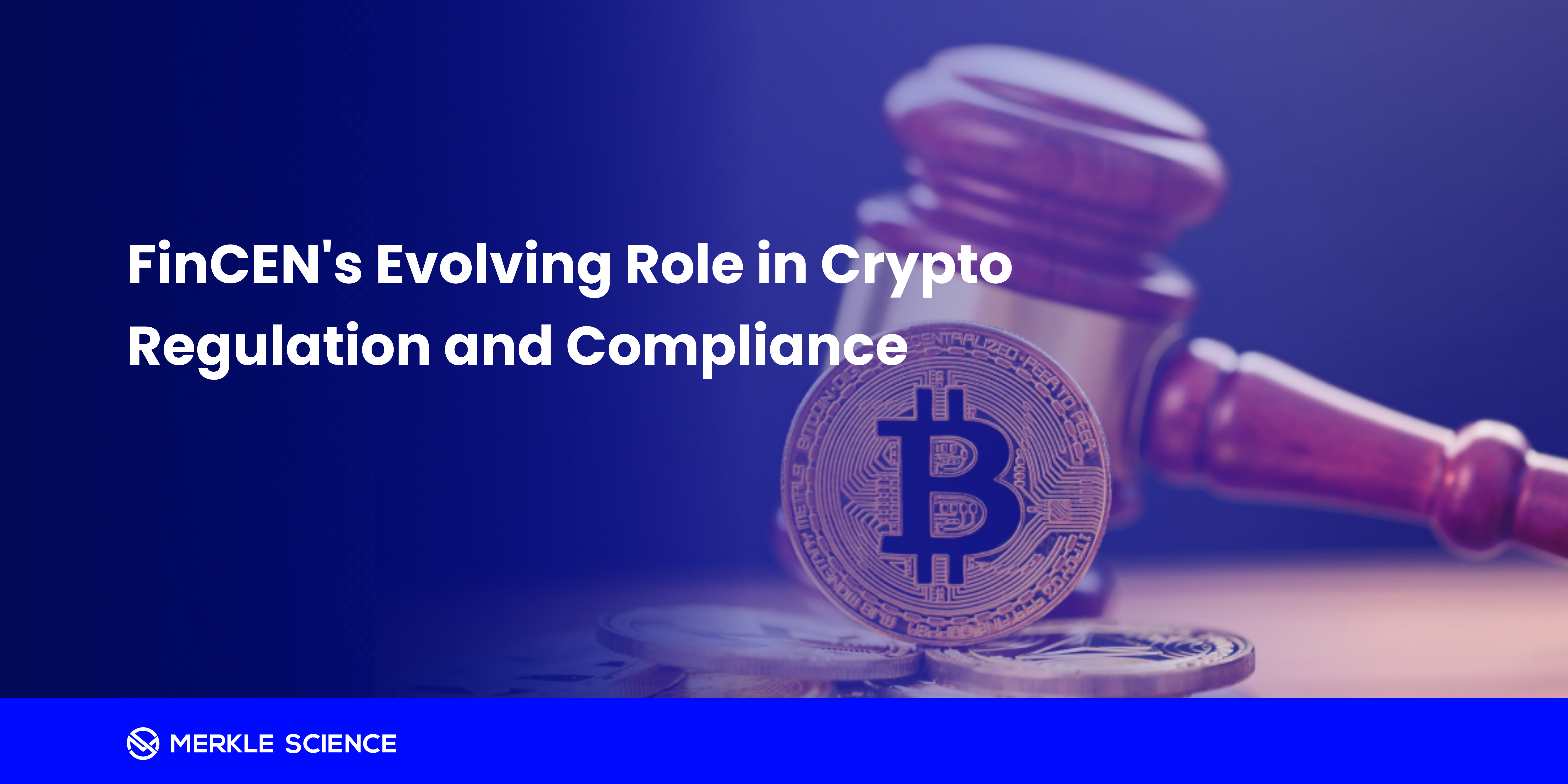FinCEN's Evolving Role in Crypto Regulation and Compliance

Robert Whitaker

As the cryptocurrency landscape continues to evolve, the Financial Crimes Enforcement Network (FinCEN) is at the forefront of ensuring that this emerging sector adheres to stringent anti-money laundering (AML) and counter-terrorist financing (CTF) standards. In 2024, FinCEN’s role in regulating cryptocurrencies has become increasingly significant, reflecting the growing importance of digital assets in the global financial system. This article explores FinCEN’s expanding role in crypto regulation, the application of existing legal frameworks to digital assets, and the agency’s efforts to combat financial crimes involving cryptocurrencies.
FinCEN’s Mission and Approach to Crypto Regulation
Cryptocurrencies have transformed the financial ecosystem, offering new opportunities for innovation while also presenting challenges in terms of regulatory oversight and compliance. FinCEN, a bureau of the U.S. Department of the Treasury, has taken on the critical task of adapting existing financial regulations to the world of digital currencies. This adaptation is crucial for preventing the misuse of cryptocurrencies for illicit activities such as money laundering, fraud, and terrorist financing. As FinCEN continues to refine its regulatory approach, understanding the agency’s role and the impact of its policies is essential for businesses and individuals operating in the crypto space.
FinCEN’s primary mission is to safeguard the financial system from illicit use, combat money laundering, and promote national security through the collection, analysis, and dissemination of financial intelligence. In the context of cryptocurrencies, this mission involves the careful application of existing regulatory frameworks to ensure that digital assets are not exploited for illegal purposes.
FinCEN’s Application of Existing Regulatory Framework
Rather than creating new laws specifically for cryptocurrencies, FinCEN has focused on applying existing financial regulations to the crypto sector. In its interpretive guidance, FinCEN clarifies how existing rules, such as the Bank Secrecy Act (BSA), apply to various business models involving convertible virtual currencies (CVCs). This includes crypto exchanges, wallet providers, and other entities that facilitate the transfer of value through digital assets. By aligning the crypto sector with established financial laws, FinCEN aims to maintain regulatory consistency while addressing the unique challenges posed by digital currencies.
Crypto Asset Businesses as Money Services Businesses (MSBs)
One of the key regulatory strategies FinCEN employs is classifying certain crypto businesses as Money Services Businesses (MSBs). This designation subjects these entities to a range of federal regulations designed to prevent money laundering and other financial crimes. Registered MSBs must comply with the Bank Secrecy Act, which entails several critical responsibilities:
- AML Program Development: MSBs are required to develop, implement, and maintain effective AML programs. These programs must include policies, procedures, and internal controls specifically designed to ensure compliance with the BSA.
- Customer Due Diligence (CDD): MSBs must adhere to strict Know Your Customer (KYC) requirements, ensuring that they verify the identities of their customers and assess their risk profiles.
- Reporting Requirements: MSBs are obligated to report certain transactions to FinCEN, including filing Currency Transaction Reports (CTRs) for transactions over $10,000 and Suspicious Activity Reports (SARs) for any transactions that may involve illicit activity.
- Funds Transfer and Travel Rules: MSBs must comply with the Funds Transfer Rule and the Funds Travel Rule, which require the collection and transmission of specific information regarding fund transfers and recipients.
These measures are critical for ensuring that the rapidly growing crypto industry operates within a regulated framework that protects against financial crime.
FinCEN Advisory & Alerts in the Crypto Space
To assist financial institutions and crypto businesses in navigating the complex regulatory landscape, FinCEN regularly issues advisories and alerts. These documents are designed to highlight emerging risks, provide guidance on compliance, and ensure that financial institutions remain vigilant against new threats.
- Advisory on Illicit Activity Involving Convertible Virtual Currency: This advisory helps financial institutions identify and report suspicious activities related to the misuse of CVCs. It outlines prominent typologies and red flags, assisting institutions in detecting and preventing money laundering and other illicit uses of digital assets.
- FinCEN Alert on Prevalent Virtual Currency Investment Scams: Known as “pig butchering,” this scam involves fraudsters luring victims into fake investment schemes. FinCEN’s alert raises awareness of these scams, helping institutions to identify and block fraudulent transactions.
- Alerts on Sanctions Evasion and Terrorist Financing: In response to geopolitical events, FinCEN has issued alerts to monitor and prevent the use of cryptocurrencies for evading international sanctions or financing terrorist organizations. These alerts emphasize the importance of enhanced due diligence and transaction monitoring in high-risk scenarios.
These advisories and alerts play a crucial role in keeping the financial industry informed and prepared to combat the misuse of digital currencies.
Notice of Proposed Rulemaking (NPRM) on CVC Mixing
A significant development in FinCEN’s regulatory efforts is the Notice of Proposed Rulemaking (NPRM) issued in October 2023, which identifies international CVC mixing as a class of transactions of primary money laundering concern. CVC mixing services, often used to obscure the origins of digital funds, pose significant risks by facilitating money laundering and other illicit activities. The NPRM proposes increased transparency around these services to combat their use by malicious actors, including terrorist organizations like Hamas and the Democratic People’s Republic of Korea (DPRK).
This proposed rule highlights FinCEN’s proactive approach to addressing the sophisticated methods that criminals use to exploit cryptocurrencies, demonstrating the agency’s commitment to evolving its regulatory strategies in response to emerging threats.
FinCEN’s Enforcement Actions Against Crypto Companies
As the cryptocurrency industry grows, FinCEN has been actively enforcing compliance with anti-money laundering (AML) and counter-terrorist financing (CTF) regulations. Several high-profile cases highlight FinCEN’s commitment to ensuring that crypto businesses operate within the bounds of U.S. law.
BTC-e (2017)
In 2017, FinCEN took its first enforcement action against a foreign-located money services business by penalizing BTC-e, a virtual currency exchange, with a $110 million fine. BTC-e, operated by Russian national Alexander Vinnik, was involved in facilitating transactions for ransomware, darknet drug sales, and other illicit activities. The exchange failed to implement AML programs and openly facilitated criminal transactions, leading to its seizure and the arrest of its operator.
Helix and Coin Ninja (2020)
FinCEN assessed a $60 million civil penalty against Larry Dean Harmon, the operator of Helix and Coin Ninja, two Bitcoin mixing services. These services were used to anonymize transactions, facilitating illicit activities including drug trafficking and child exploitation. Harmon operated these services without registering as a money services business (MSB) and deliberately circumvented AML requirements. The case marked the first time FinCEN penalized a Bitcoin mixer for violating AML laws, setting a precedent for future enforcement in the crypto space.
BitMEX (2021)
In August 2021, FinCEN announced a $100 million enforcement action against BitMEX, a major cryptocurrency derivatives exchange, for willfully violating the BSA. BitMEX operated as an unregistered futures commission merchant and failed to implement required AML and customer identification programs. The exchange conducted transactions with high-risk jurisdictions and failed to report suspicious activities, exposing the U.S. financial system to significant risks. BitMEX was also required to undergo a historical analysis of its transaction data to ensure compliance with SAR reporting.
Binance (2023)
In November 2023, FinCEN, alongside the Office of Foreign Assets Control (OFAC) and the IRS Criminal Investigation division, announced a historic $3.4 billion settlement with Binance Holdings Ltd., the largest virtual currency exchange in the world. Binance was found to have willfully violated the Bank Secrecy Act (BSA) and sanctions laws by failing to implement adequate AML programs and permitting transactions involving sanctioned entities, including terrorist organizations and cybercriminals. As part of the settlement, Binance agreed to a five-year compliance monitorship and a mandated exit from the U.S. market.
Conclusion
As cryptocurrencies become increasingly integrated into the global financial system, FinCEN’s role in regulating this sector has never been more critical. By applying existing financial laws to the crypto landscape, classifying crypto businesses as MSBs, and issuing targeted advisories and alerts, FinCEN ensures that digital assets are used responsibly and that the financial system remains secure from exploitation.
FinCEN’s ongoing efforts, including its proposed rules on CVC mixing and its collaboration with financial institutions and crypto businesses, reflect the agency’s commitment to adapting to new challenges while maintaining the integrity of the financial system. For businesses operating in the crypto space, understanding and adhering to FinCEN’s regulatory requirements is essential for staying compliant and mitigating the risks associated with digital currencies.
Stay ahead of evolving crypto regulations and ensure compliance with Merkle Science’s advanced tools and solutions tailored for the digital asset ecosystem. Get in touch to learn more.


